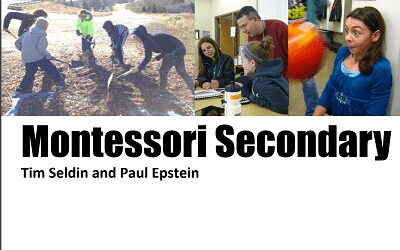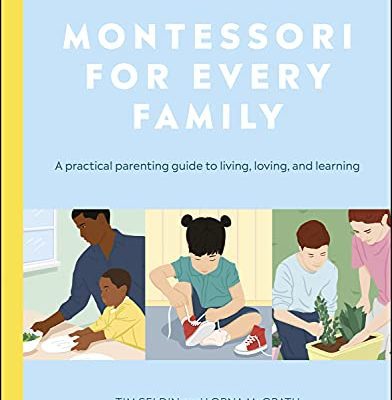The racial awareness of children is often significantly underestimated. Studies have shown that by three months of age, infants can notice and express preference by race and by nine months of age, they can categorize people by race. There is strong evidence demonstrating racial bias in children as young as three years of age (Waxman, 2021, and Sullivan; Wilton, and Apfelbaum, 2020). Based on Maria Montessori’s description, children entering the second plane of development (roughly 6-7 years of age) develop ethical perspectives about life. “They have character, they have a great sense of honesty, they cannot see injustice without intervening …” (Montessori, 1971). Despite this knowledge, there seems to be a tremendous fear in our country about discussing race and racial issues with children.
History–the study of how the past has shaped our current existence–is the pillar of the Montessori educational approach for children 6-12 years of age known as “Cosmic Education.” The stories of people with different lived experiences and perspectives provide the tapestry within which students weave their own unique identities, shape their own futures, and develop empathy, dignity, and a sense of justice. Educators are tasked with skillfully guiding students to critically examine the narratives of history. This includes offering guidance about the concepts of race and justice and what those concepts mean in American society and culture today. “We must put everything before [them], the school, culture, religion, the world itself. We must help [them] to develop within [themselves] that which will make [them] capable of understanding. It is not merely words; it is a labor of education. This will be a preparation for peace – for peace cannot exist without justice and without [people] endowed with a strong personality and a strong conscience” (Montessori, 2019).
Contrary to this, many legislators around the country are actively working to pass what has come to be known as anti-CRT legislation. These “anti-divisive concept” laws are very calculated and direct in their efforts to misrepresent the definition and the intended application of CRT, resulting in legislation that will uphold structural racism and suppress the teaching of a more representative history. CRT has also been employed as a legal framework, or lens, through which scholars, and those who are professionals within the American legal system, examine how the laws of the United States have been impacted by the social construct that we refer to as race. CRT’s framework has remained consistent since it was originally penned, however, this work is now being willfully and actively misinterpreted and erroneously defined to serve as an umbrella term for any teaching about race in our country’s history, which ultimately prevents schools and educators from presenting students with truthful historical information.
Educators would do well to understand how the concept of CRT is being presented to parents, teachers, and school leaders by these policymakers. Many anti-CRT proponents are vilifying it, which “took shape starting with a concerted effort to mischaracterize it… Conflate it with terms that poll poorly (e.g., Antifa and wokeness). Redefine it as an assault on American values” (Civic Way, 2020). It is critical to understand that historically, and now, consequential decisions regarding civic and history education are being made and legally ‘baked’ into the very system that the CRT framework sought to examine and expose as problematic.
“Between January and September 2021, 24 legislatures across the United States introduced 54 separate bills. Forty-eight bills explicitly apply to teaching in some form in public schools” (Pardlo, 2021). “As of October 1, 2021, Oklahoma, Tennessee, Florida, Arkansas and Iowa have passed bills. Bills have also either passed or are being considered in Arizona, Georgia, Idaho, Kentucky, Louisiana, Michigan, Missouri, New Hampshire, North Carolina, Rhode Island, South Carolina, South Dakota, Texas, Utah, Virginia, and West Virginia. The Tennessee law stipulates that the state education commissioner must withhold state funds if a public school “knowingly violates” the ban on teaching 14 different concepts that range from discrimination to privilege to racial bias to the idea that “all Americans are not created equally” (Camera, 2021). “A parent in Williamson County, Tennessee, has already cited the law in a complaint that alleges that a teacher’s lesson on Ruby Bridges, the 6-year-old girl who became the first African American student to integrate a school in the South, made her child feel uncomfortable” (Penderharker, 2021).
As of February 2022, the effort to restrict curricula content regarding the contributions of specific racial or ethnic groups to U.S. history, or related topics is growing. “So far, at least 36 states have adopted or introduced laws or policies that restrict teaching about race and racism. With 2022 state legislative sessions underway, new legislation is in the pipeline” (Stout and Wilburn, T., 2022). The American culture debate has gotten so intense that former President Trump has informed Americans that, “Getting critical race theory out of our schools is not just a matter of values, it’s also a matter of national survival. We have no choice, the fate of any nation ultimately depends upon the willingness of its citizens to lay down and they must do this, lay down their very lives to defend their country” (Levin, 2022).
This campaign has instilled fear in school boards and incited frenzies and passionate public debates. Many of these frenzies are a part of a coordinated strategy to negatively affect funds for state-supported schools, including Montessori public schools, if the districts do not comply with these new laws. Many of these potential laws include clauses that will issue state-imposed fines on state educators teaching uncomfortable concepts. This can potentially reduce overall teacher retention rates. “The debate is between people who think children should not be burdened with the past, and those who want them to learn how the legacy of that past shapes American society today” (Waxman, 2021).
The issue is not whether educators of young children will teach graduate-level theoretical frameworks, such as CRT in PreK-12 classes, which is not happening in most schools across the land. The issue appears to be whether a more representative and uncomfortable history or if a more comfortable and “race-neutral” history will be taught. In this time and place, it is necessary that all educators “pledge to teach the truth” (Zinn, 2021) about the tapestry of cultures that have contributed well to this nation and to guide children to appreciate this history. This education does not emerge by osmosis. It is vital that educators assume responsibility to inform students and help them see the strengths they have as individuals to learn, change, and grow.
Citations
Camera, L. (June 23, 2021) Bills Banning Critical Race Theory Advance in States Despite Its Absence in Many Classrooms. US News and World Report. Retrieved from https://www.usnews.com/news/education-news/articles/2021-06-23/bills-banning-critical-race- theory-advance-in-states-despite-its-absence-in-many-classrooms
Civic Way. (2020) Critical Race Theory: Fact vs. Fiction Retrieved from:
https://www.civicway.org/saving-democracy/critical-race-theory-fact-versus-fiction/ on 02/15/2022
Levin, B. (2022, March 14) Trump Tells Supporters They Must Fight to the Death to Stop Schools from Teaching Kids About Systemic Racism. Vanity Fair. Retrieved from: https://www.vanityfair.com/news/2022/03/donald-trump-critical-race-theory-lay-down-lives
Montessori, M., ed. Montessori, Mario (1971). The Four Planes of Education. Distributed by Association of Montessori International/USA
Montessori, M. (2019). Citizens of the World. (The Montessori Series). Amsterdam, The Netherlands: Montessori-Pierson Publishing Company.
Pardlo, G. (November 8, 2021) Educational Gag Orders. PEN America Retrieved from: https://pen.org/report/educational-gag-orders/
Pendharkar, E. (September 13, 2021) He Taught About White Privilege and Got Fired: Now He’s Fighting to Get His Job Back. EducationWeek Digital Magazine. Retrieved from: https://www.edweek.org/teaching-learning/he-taught-about-white-privilege-and-got-fired-now- hes-fighting-to-get-his-job- back/2021/09?utm_source=nl&utm_medium=eml&utm_campaign=eu&M=63438668&U=&UU ID=47a77b8482195e24bcc18405b3ae79d7
Stout, C. and Wilburn, T. (2022, February 1) CRT Map: Efforts to restrict teaching racism and bias have multiplied across the US. Chalkbeat. Retrieved from: https://www.chalkbeat.org/22525983/map-critical-race-theory-legislation-teaching-racism on 03/14/2022.
Sullivan, J., Wilton, L., & Apfelbaum, E. P. (2020, August 6). Adults Delay Conversations About Race Because They Underestimate Children’s Processing of Race. Journal of Experimental Psychology: General. Advance online publication. http://dx.doi.org/10.1037/xge0000851
Waxman, OB. (July 2021). ‘Critical Race Theory Is Simply the Latest Bogeyman: Inside the Fight Over What Kids Learn About America’s History.’ Time Magazine. Retrieved from: https://time.com/6075193/critical-race-theory-debate/
Zinn Education Project: Teaching People’s History. “Pledge to Teach the Truth” Retrieved from: https://www.zinnedproject.org/news/pledge-to-teach-truth on 12/21/2021.
Resources
Delgado, R. and Stefancic, J. (2017) Critical Race Theory: An Introduction, Third Edition New York University Press, New, York, NY
Dillard, C. (January 23, 2019) Five Ways to Avoid Whitewashing the Civil Rights Movement.
Learning for Justice Magazine. Retrieved
from: https://www.learningforjustice.org/magazine/five-ways-to-avoid-whitewashing-the-civil- rights-movement
Lesson Plans. Learning for Justice Magazine. Retrieved from: https://www.learningforjustice.org/classroom-resources/learning-plans on 12/21/2021.
Takaki, R. and Stefoff, R. (2012) A Different Mirror for Young People: A History of Multicultural America (For Young People Series). New York, NY: Seven Stories Press
Zinn Education Project: Teaching People’s History. “Pledge to Teach the Truth” Retrieved from: https://www.zinnedproject.org/news/pledge-to-teach-truth on 12/21/2021.




